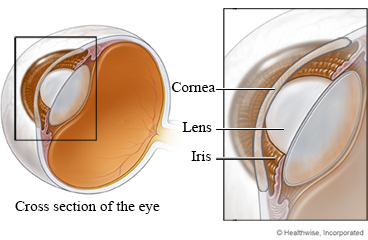LASIK: What to Expect at Home
Your Recovery

Laser in-situ keratomileusis (LASIK) is surgery to improve your
vision. The doctor used surgical tools to keep your eye open and to
apply pressure to the outside layer of your eyeball (cornea). The
doctor used a special blade or laser to cut a flap in your cornea.
Another laser was used to remove or reshape your eye tissue. Then
the doctor put the flap back, added drops to your eye, and placed a
clear, protective shield over your eye.
Your eye may burn, itch, be teary, or feel like there is something
in it for 3 or 4 days after surgery. But it's important not to rub
your eye. Rubbing your eye could damage it.
You will probably be able to return to work or your normal routine 1
to 3 days after surgery. For a few days, you may have blurry vision
or watery eyes. Your eyes may be bloodshot for up to 3 weeks. This
is because LASIK surgery can cause small blood vessels in your eye
to break. Some people also find that they are sensitive to light or
see starbursts or halos for 1 to 3 weeks after surgery.
If you have eye pain, your doctor may prescribe drops or medicines.
You can expect your eye to get better each day, but it may feel dry
for 1 to 3 months after surgery. Over-the-counter or prescription
eyedrops can help with dryness.
For some people, it takes 3 to 6 months to get the full benefits of
surgery and to see as clearly as possible.
This care sheet gives you a general idea about how long it will take
for you to recover. But each person recovers at a different pace.
Follow the steps below to get better as quickly as possible.
How can you care for yourself at home?

Activity
|
|
|
|
|
|
|
|
|
|
|
-
You can shower or wash your hair the day after surgery.
Keep water, soap, shampoo, hair spray, and shaving lotion
out of your eye, especially for the first week.
|
|
|
|
|
|
|
|
|
|
|
|
-
For 1 to 2 weeks, avoid swimming, hot tubs, gardening, and
dusting.
|
|
|
|

Medicines
Follow-up care is a key part of your treatment and safety. Be
sure to make and go to all appointments, and call your doctor if you
are having problems. It's also a good idea to know your test results
and keep a list of the medicines you take.
When should you call for help?
 Call 911 anytime you think you may need emergency care.
For example, call if:
Call 911 anytime you think you may need emergency care.
For example, call if:
Call your doctor now or seek immediate medical care if:
Watch closely for changes in your health, and be sure to contact
your doctor if:
Current as of: June 5, 2023
Content Version: 14.0
Care instructions adapted under license by your healthcare professional. If you have questions about a medical condition or this instruction, always ask your healthcare professional. Healthwise, Incorporated disclaims any warranty or liability for your use of this information.